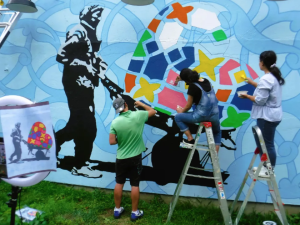
Fleeing suppression, Afghan artists make a statement in Vermont
The ArtLords, known for painting their war-torn capital of Kabul with Taliban-censored messages of human rights and social justice, have created their first permanent mural in the Green Mountain State.
By Kevin O’Connor | VTDigger | August 16, 2023
The “ArtLords” street activist movement paints its first permanent Vermont mural on the Brattleboro’s Foodworks building. Photo by Kevin O’Connor/VTDigger
BRATTLEBORO — Negina Azimi stirred up a rainbow of mural colors as she recalled the dark day two years ago that irrevocably stained her world.
“It’s August, when the Taliban took over the country,” she said of events in her homeland of Afghanistan.
The 24-year-old member of the ArtLords street activist movement once painted walls in the war-torn capital of Kabul with statements of human rights and social justice. Then fundamentalist forces opposed to free expression seized power in the summer of 2021, spurring millions of Afghans to flee.
Azimi and four other artists were among the first of several hundred refugees to resettle in Vermont. Their new town of Brattleboro, population 12,184, offers a different landscape than their former home city of nearly 5 million people. Then again, one view is familiar: the ArtLords’ first permanent mural in the Green Mountain State.
“It’s something that represents us,” Azimi said of the new work on Brattleboro’s Foodworks building, which pictures an Afghan laborer pushing a wheelbarrow literally spilling with heart.
Azimi, profiled by the British newspaper The Guardian on her way to the United States, spoke about fleeing her country while fighters, seeing her work as a mark against hardline Islamic beliefs, painted over its messages of empowerment.
“We heard that the Taliban inquired about us to the shopkeepers and asked for our addresses,” she told the Guardian. “They wanted to punish us.”
Azimi’s fellow ArtLords in Vermont — Abdullah, Marwa, Meetra and Zuhra — favor using only their first names in the press to protect their families back home. With varied knowledge of English, they often let their work speak for itself.
“Overall,” said Abdullah, 27, “it shows humanity, harmony, peace, love, kindness, compassion, community.”
Since its start in 2014, the ArtLords movement has painted some 2,000 walls throughout Afghanistan, drawing attention from media outlets ranging from National Public Radio to The New York Times.
“We want to turn public opinion into murals; that’s why we paint what we hear on the streets,” spokesperson Abrar Kakarr told the press before the 2021 withdrawal of U.S. and Allied forces.
Since the Taliban takeover, members have spread their message worldwide. The ArtLords introduced themselves to Vermont a year ago when they re-created past murals with masking tape for a pop-up show at the Brattleboro Museum and Art Center. The group then connected with the nearby Groundworks Collaborative, which operates the Foodworks building on Canal Street.
The ArtLords based their latest mural on one of their most recognized images — a Banksy-style Afghan worker pushing a wheelbarrow. Members then added a blue Persian background and replaced a traditional red heart with a multicolored one.
“Vermont is a community full of different people,” Azimi said, “so it’s a symbol of them all together.”
Azimi came to the state with the help of the Ethiopian Community Development Council, where she now works. The Brattleboro-based agency, funded in part by the U.S. State Department, is resettling refugees in Windham and Bennington counties, while peers at the Colchester office of the U.S. Committee for Refugees and Immigrants are welcoming Afghans in Chittenden and other nearby counties.
One may wonder why city dwellers are being relocated to a rural state. Azimi and her peers appreciate the change.
“We have been through a lot,” she said, “so we wanted a really quiet place to start our new life.”
Added Abdullah, an information technology specialist: “We needed such a space to detox ourselves from the traumas.”
Having finished their first Vermont mural, the ArtLords are contemplating their next. When gathered, they enjoy speaking to each other in Persian — and to the larger community through paint.
“Art is a very common language,” Azimi said. “It’s a way we can understand each other from the heart.”
